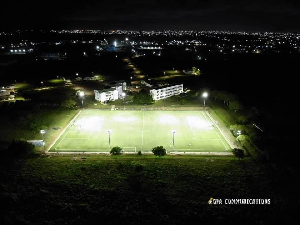Diasporia News of Tuesday, 10 November 2015
Source: chicagotribune.com
Absent school board member visits Ghana
As the Will County state's attorney's office continues to probe the residency status of long-absent Crete-Monee School District 201U Board member Edward Anderson, recent Facebook posts indicate that he's on a mission to the West African nation of Ghana.
As I noted in columns last month, Anderson's months-long absence from school board meetings has provoked calls for his resignation by fellow board members and parents who claim that he has moved to Jacksonville, Fla., where he has incorporated a religious organization called the World Overcomes Worship Center. A filing of incorporation with that state lists Anderson as the corporation's registered agent.
A Nov. 4 Facebook post on the World Overcomers Worship Center website features photographs of Anderson along with the following message, "Night 1: Apostle Anderson preaching at the pastor's conference in Obuasi, Ghana."
District 201U residents contend that they have repeatedly tried to contact Anderson via email and phone calls without success. School administrators have said they don't know how long Anderson will be absent and have been told only that he's doing missionary work.
Complaints to the Will County regional school superintendent, Shawn Walsh, that Anderson no longer lives within the boundaries of District 201U led Walsh to contact State's Attorney James Glasgow's office and request an inquiry into Anderson's residency.
District 201U attorney Bill Gleason has said that, under the Illinois school code, Anderson can miss School Board meetings for years and still be considered a resident of the district and a board member in good standing as long as his intent is to remain a resident of the district.
The legal case most often cited regarding "intent" is that of Chicago Mayor Rahm Emanuel, who ran for mayor after having lived in Washington, D.C., for years. The facts that Emanuel retained ownership of his house in the city, that his wife's wedding dress remained in the basement and that his voter registration card listed his Chicago address were among the evidence cited as proving that Emanuel's intent was to remain a resident of Chicago.
Anderson's critics site legal documents that his Crete house is in foreclosure and reports from neighbors that he moved his wife and belongings to Florida as evidence that he no longer resides in District 201U.
Despite calls from School Board members, parents and this column that Anderson clarify his intentions, he has not made any public statements about his willingness to return to Illinois and has refused to address the issue of how long he may be gone.
When the controversy erupted at a school board meeting last month, three white board members who asked for a special session to discuss Anderson's absence walked out, one of the three black members implied that their action was racially motivated and another black member complained about being left off an email chain about the special session.
Three members of the board are white and four are black (including Anderson). Critics of Anderson have said the School Board has been split 3-to-3 along racial lines on several issues since he departed for Florida, one of the key areas of contention being a multimillion-dollar expansion project for a middle school.
While a School Board member's absence might be felt in any district, some District 201U residents contend that Anderson's is more impactful because board members are elected to represent specific geographic areas, or subdistricts.
That's the result of a lawsuit filed years ago by residents of University Park who felt they were underrepresented on a School Board traditionally dominated by Crete. Anderson's district includes parts of Crete and unincorporated areas.
Board member Mike Turay, who is white and represents another subdistrict that include portions of Crete, has voiced frustration over the vagaries of Illinois law, which apparently allow a school board member to be absent for years so long as his intent is to someday return.
"If he (Anderson) is doing missionary work, or whatever, he should just resign from the school board and let someone else take his place who can attend meetings and fulfill all the other obligations of a School Board member," Turay said. "I don't understand why we have to go through all this when it could be settled very simply if he stepped down."
Turay has been a leader in calling for a probe into Anderson's residency status and vocal in his demands that the board hold a hearing to determine if Anderson has actually moved or intends to return in the near future.
A spokesman for the state's attorney's office this week said that its residency investigation is continuing, and there was nothing new to report.
Despite the allegations of racism hurled at Turay, it seems obvious that anyone who runs for elected office owes it to the people who elected him to represent them fully or to step aside if they are unable to do so for an extended period of time. Anderson hasn't even bothered to respond to the criticisms raised about his residency status, which in itself demonstrates a disdain for those who elected him.
In addition to Gleason, noted election law attorney Burton Odelson said if Anderson is doing missionary work and has maintained his home in the district, it might be difficult to find a valid reason under Illinois law to remove him.
However, Odelson added that a School Board does have the authority to conduct a residency hearing if it believes there's sufficient evidence to prove a board member has relocated out of the school district, taking his possessions and his family with him. Odelson, the attorney for the losing side in the Emanuel residency case, noted that the law in Illinois is quite murky when it comes to determining residency.
And that goes to the heart of the issue here. The law needs to be clear and make sense. Residents are entitled to know if their elected official is living out of state and, if so, how long he intends to be absent.
Contending that questioning Anderson's residency is racist is an injustice to those who have spent their lives battling bigotry and campaigning for civil rights — while providing ammunition for those who claim the allegation is used as a shield to defend conduct and positions that have no legitimate defense.
Anderson has blacks and whites among his constituents. His lack of representation is an injustice and disrespectful to all voters in his subdistrict. No one on the District 201U School Board, black or white, has said at a public meeting that they were able to contact Anderson since the controversy arose or has received a response from him in writing defending his long absence.
If the man isn't willing to defend himself, if he doesn't believe his residents are owed an explanation, then he quite clearly doesn't belong in public office. If he doesn't resign, he should be removed.










